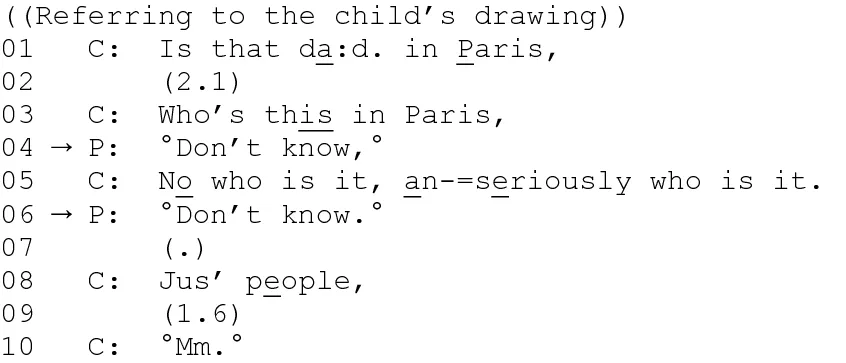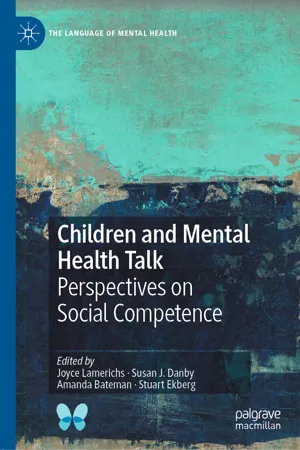The World Health Organisation estimates that worldwide 10–20% of children and adolescents experience mental health problems (WHO, 2018). Beyond the boundaries of these clinically defined populations and conditions, children experience a range of ordinary and extraordinary circumstances that affect their mental health and wellbeing. Throughout their lives, children may participate in a range of different institutional settings where emotional, behavioural and neurodevelopmental matters are attended to as relevant for the purposes of that institution. This might occur in clinical settings where mental health and wellbeing comprise a primary institutional focus. Beyond such institutions, the mental health and wellbeing of children also are of relevance in a range of other institutional settings, such as in educational or judicial systems or in the course of research. Studies in these different contexts show the differing understandings of children’s interactions and a range of practices from those professionals who support children to manage their health and wellbeing. Rather than considering mental health and wellbeing issues as external forces that happen to the child, the perspective here taken is that children are directly involved in the process of talk around mental health issues in everyday contexts, positioning them as interactionally competent and capable. The undertaking of fine-grained analyses using ethnomethodological and conversation analysis approaches makes it possible to observe of the multifaceted ways that children manage and display social competence in a range of institutional settings.
From a Developmental to an Interactional Perspective on Children’s Social Competence
The concept of children’s competence often is framed as an assessment of children’s capability. Claims of children as competent —or not—are driven by underlying paradigms that provide conceptual constructions of the child as developing competence, prominent in many sociological and psychological studies. As you read the chapters of this book, you will see that the theoretical framing of children’s interactional competence is located and described as in situ competence. In this understanding, first recognised by the early ethnomethodologists, we describe children as ‘competent interpreters in the world’ (Mackay, 1991: 31). The early ethnomethodologists, including Robert Mackay (1991) and Matthew Speier (1971, 1973), were the first to write about the social competence of children. Their pioneering work investigated children’s interactional competence in everyday interactions, and this theoretical framing of children’s competence can be located and described as in situ competences.
A sociological perspective recognises children as collaboratively producing and making sense of their worlds through their social interactions in everyday life and involves examining how children display their social competence in situ. For example, Danby and Baker (2000) showed how first impressions of young children’s interactions can suggest that they have an undeveloped idea of turn taking, an essential feature of social interaction . A study of preschool-aged boys in the classroom showed how they talked over each other, so that they did not wait until one had finished their turn before another started. The talk gave the appearance of speaker turns being unorganised and jumbled. Yet detailed analysis showed that they were not engaging in interactions that were chaotic but, rather, the talk was ordered and systematic. The specific element for being heard was to have the speaker’s main message audible; recycling their initial turns of talk that overlapped with another meant that their main message was heard in its entirety. The finding showed that young children’s talk was not disorderly nor chaotic but that it used the same features as adult talk. As Schegloff (1987) found in adult conversations, adults routinely talk over each other to get the floor for speaking yet, as Danby and Baker (2000) found, 3- and 4-year-old children also do this to gain the floor. In our society, the developmental perspective is so persuasive that it is easy to think that the practice of children talking over each other is there because they have not learned to take turns at talk.
It is not always possible, though, for children to engage in the conversations that are about them or involve them in some way. Children often are not afforded the opportunity to be included and, even when they are included, they elect to not contribute to the talk about them or involving them, even when asked. One way in which children can display their competence is by resisting engagement in discussions about their mental health (Hutchby, 2002; O’Reilly & Parker, 2013). One well-documented practice that children use is to disclaim knowledge with expression such as ‘I don’t know’ (Hutchby, 2002; Lamerichs, Alisic, & Schasfoort, 2018; O’Reilly, Lester, & Muskett, 2016; Stafford, Hutchby, Karim, & O’Reilly, 2016; Stickle, Duck, & Maynard, 2017). There is no reason, however, to assume that these knowledge disclaimers index a state of mental incompetence. For example, Hutchby (2002) considers an example from a child counselling session where a child client responds with ‘don’t know’ to 57 of the 92 questions asked by his counsellor. The following fragment shows two of these responses:
The child first disclaims knowledge at line 4. Given that what is being disclaimed is knowledge about a picture that he has just drawn, this response is treated as non-serious by the counsellor, rather than an indication of the child’s actual mental state. Here and elsewhere in this session, disclaiming knowledge is employed by the child client to continue avoiding the counsellor’s questions, even after his pursuit of a serious response. Disclaiming knowledge highlights the socially competent ways that chi...


